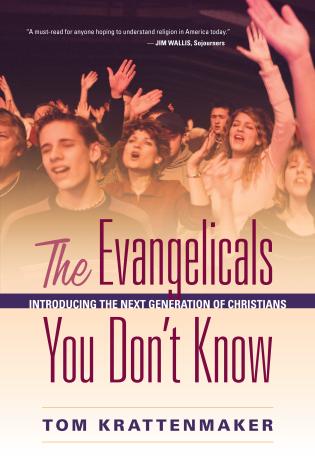
The Evangelicals You Don’t Know: Introducing the Next
Generation of Christians by Tom Krattenmaker
Tom Krattenmaker, author of Onward Christian Athletes and
Religion and Public Life Columnist for USA Today has written a provocative and
unique book on the new face of evangelicalism.
This new book, The Evangelicals You Don’t Know, provides a fresh look
into some leaders in the evangelical movement that you might not have hear of
and who minister in very different ways than their evangelical forefathers. The result of the book is a reorientation
with leaders who do ministry in fresh and invigorating ways, at times including
leaders in their respective communities who are diametrically opposed to their
beliefs but want to seek the common good together. Rather than just ride on the coattails of
previous leaders such as James Dobson, the new Focus on the Family President
Jim Daly focuses his effort on less overt political matters and more on
equipping families to grow and sustain healthy relationships. Although the book
at times still has the flavor of someone on the opposite spectrum criticizing
evangelicals for their beliefs, Tom is quick to point out how progressive
conceptions of evangelical leaders are often hearsay and littered with false
beliefs.
Evangelical leadership in the past has time and again
focused on the preaching of the good news to bring converts into their
ranks. Yet, this line of ministry has
not been without its faults. In
Portland, under the ministry of Kevin Palau, son of preacher Luis Palau, there
is a network of evangelical churches committed to helping surrounding communities
with service projects full of the help of hundreds of volunteers (18). Tom writes, “Called the Seasons of Service,
the annual campaign consists of free medical and dental clinics; public school
beautification and mentoring efforts, shelters for victims of sex trafficking;
drives to provide the homeless with food, clothing shelter, and counseling; and
other good works” (18). Later on in the
chapter Tom indicates that for Kevin Palau, he is still willing to you about
how Jesus changed his life but he is engaging the Portland community with no
strings attached in an effort to serve the people in the city without an
ulterior motive. For Kevin, this effort
meant going before the Mayor of Portland and asking, “What could the church
community do to help” (27)? The new
Mayor Sam Adams felt a sense of anxiety about the evangelical community helping
due to a perception that this work might just be a ploy to proselytize. Yet, after the first year of seeing 550
churches involved, 27,000 volunteers and over 300 service projects maintained,
the Seasons of Service initiative was a major success that other cities are
seeking to emulate.
The Mecca of Evangelical organizations, Colorado Springs, is
also home to Focus on the Family. The
author made a trip there to interview President Jim Daly and take a tour of the
campus. After sensing the shift from a political
driven, abrasive leader in James Dobson, the present President Jim Daly has
taken a different approach to things.
Daly has been an advocate of partnering with less than conservative
groups for good causes, including trying to partner with TOMS shoes. Yet, I think the line of thought that
Krattenmaker takes is very wise in considering Focus on the Family. He writes, “The good done by Focus on the
Family is still good, whether it’s
motivating church members to put their pro-life money where their mouths are
and adopt foster-kids, whether it’s consoling and counseling a panicked parent
who marriage is in crisis, or whether it’s trying to promote TOMS Shoes and the
footwear it provides to needy children” (189).
Progressives will never fully agree with Daly’s stand on issues of life,
marriage, or faith driven policies, but there are many issues where a common
stand is not only appropriate but dearly needed. Overall, I think the chapter outlined some of
the changes in tone and outlook for Focus on the Family that came about with
the hiring of Jim Daly. A new face for
an organization rooted in bringing hope to families was needed and Daly provides
that vision.
This book is a great look at evangelical leaders who lead
with a different vision than leaders of the past. Seeking the common good of all, partnering
with organizations who don’t agree with their stand, gives these churches and
organizations a voice in our culture. Krattenmaker
has his own criticisms of the evangelical leaders but I think he is fast to
point out how the vision and practice of some evangelical leaders are more open
to his progressive, mainline friends.
Even more than this, the book is a lesson in understanding how
misconceptions and conjecture often are stopped dead in their tracks when
meeting with real people and the work that they do.
I was encouraged by this book and its overall emphasis on
the next evangelical leadership.
Thanks to SpeakEasy and Rowman and Littlefield Publishers
for the review copy of this book in exchange for review.
Comments
Post a Comment